TRENDS 2024: European higher education institutions in times of transition. By Michael Gaebel and Thérèse Zhang. Co-author: Henriette Stoeber (2024), European University Association (EUA)
From the Foreword by Amanda Crowfoot, EUA Secretary General:
For HEIs in Europe, the five past years has been a period of change and transformation, some gradual, others more drastic and disruptive. Managing digital transformation amid and in the aftermath of the Covid-19 pandemic tested and challenged existing practices, yet at the same time provided invaluable opportunities to mainstream the use of digital tools and digitally enhanced teaching practices. Geopolitical challenges, the war in Ukraine, and the subsequent energy and economic crises in Europe have brought to the forefront questions related not only to economic and technological sovereignty, but also to integrity, solidarity and inclusiveness. HEIs are increasingly managing diverse student profiles and cohorts, leading to a reflection on what flexible learning could and should look like.
Against this background, the Trends 2024 report provides an overview of how HEIs themselves describe their situation and how they see future developments in their sector. The report analyses the institutions’ perspectives with regard to their missions, current and prospective student enrolment, education offers, learning and teaching enhancement, societal outreach, international policies and more. Across the board, internationalisation and the contribution of, and engagement with, society are high priorities in institutions’ current and future strategies. Another area that clearly requires continued attention is the development of non-degree short education provision; this calls for
a reflection on the complementarity of degree and non-degree education in higher education, and on the role of universities in lifelong learning more broadly. While issues of university autonomy and student and staff participation were addressed in previous Trends reports, the current document also addresses for the first time the wider question of values.
